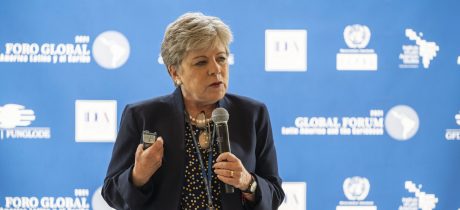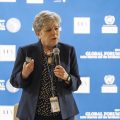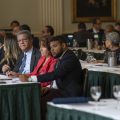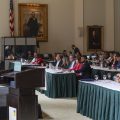Alicia Bárcena described the economic outlook facing the region during her participation in the Global Forum Latin America and the Caribbean 2021, currently taking place in New York City, during the presentation of the panel “The Pandemic and its Economic and Social Repercussions in Latin America.” She also called for regional integration to achieve greater economic and social sustainability.
NEW YORK. – “Investment is the key word for Latin America and the Caribbean at the present time.” This was proclaimed by Alicia Bárcena, Executive Secretary of the Economic Commission for Latin America and the Caribbean (ECLAC), at the third edition of the Global Forum on Latin America and the Caribbean.
She expressed the need for the economies of the region to receive the aid that allows them to redirect the projects they demand to recover the serious damages caused by the pandemic provoked by the COVID-19 virus.
Bárcena also stressed that before the health crisis the region was already registering its slowest growth rate in more than a century. Between 2014-2019 the region grew at an average rate of 0.3%, lower than the six-year period that includes World War I (0.9%) and the Great Depression (1.3%).
In the presentation of the panel “The Pandemic and its Economic and Social Repercussions in Latin America,” Bárcena said that of all the developing regions, Latin America and the Caribbean are the ones that have been hardest hit by the crisis generated by the pandemic.
The Forum is held in this American city organized by the Global Foundation for Democracy and Development (Funglode) and its sister institution in the United States, the Global Foundation for Democracy and Development (GFDD), together with the International Institute for Democracy and Electoral Assistance (IDEA International).
Bárcena explained that of the population segments young people have been the most impacted, evidenced by the loss of jobs and the failure of their particular productive initiatives.
Women have also been hard hit by the pandemic, stated Bárcena.
Elaborating on the harmful effects of the pandemic, ECLAC’s Executive Secretary said that government transfers have played a fundamental role. “The State is the one that put itself out there during this pandemic.” She pointed out that without the economic strategies adopted by the different countries, “the increase in extreme poverty would be greater.”
Another factor that has helped alleviate the crisis, according to Bárcena, have been the remittances which, she explained, have reached record levels since the health crisis began. They have helped governments preserve stability and peace.
Returning to the issue of investment, she considered that the world is not investing enough on the adaptation of the population to climate change.
Bárcena agreed with the Secretary General of the United Nations (UN), indicating that the conflict between the United States and China is the greatest danger facing the world today.
The Panelists
Other participants in the panel “The Pandemic and its Economic and Social Repercussions in Latin America and the Caribbean” were experts José Antonio Ocampo and Gerver Torres, two leading researchers from the region.
Ocampo, co-chair of Columbia University’s Initiative for Political Dialogue (IDP), called for an aggressive agenda to reduce inequality in the Latin American and Caribbean regions, defined by scholars as one of the most unequal in the world.
“It is time for a breakthrough in development banking,” Ocampo proclaimed.
Likewise, Torres – research consultant for the Gallup Company – addressed the issue of happiness in Latin America and the Caribbean.
In this regard, he said that uncertainty is one of the elements that has most negatively affected the happiness of the region´s population. “There has been a general drop in happiness,” Torres said.
The panel was moderated by Mario Báez, head of the Policy Coordination and Oversight Service of the Office of the Assistant Secretary-General for United Nations Management.
Báez claimed that before the pandemic the Latin American and Caribbean regions were growing at their lower levels after World War II. “The health problem has further complicated the situation,” he said.








